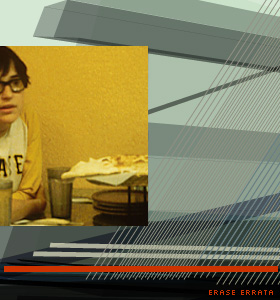Wednesday, February 18, 2026 |
||

ERASE ERRATA'S POST-RIOT GRRRL, POST-FEMINIST POST-PUNK // The Bay Area quartet creates a new kind of noise. |
|
| Interview Jenny Tatone Photography Jim McGinnis | |

Jenny Hoysten "If I'm feeling frustrated, I can't wait to go play some loud music. But I don't think it's definitely in the punk-rock tradition. I don't think it's about 'I hate the world! Let's play minor chords!' " — Ellie Erickson |
JennyTatone: In your music, I feel anger, confusion and resentment — as if it has already been scarred and broken. Are any of these emotions involved in making it?
Bianca Sparta (drums): I don't think there's any anger — do you mean in the voice or in the music? Tatone: In the music. Jenny Hoysten (lead vocals/trumpet): I think we're all just edgy. Sparta: This is the happiest band I've ever been in, like totally dancing and fun. Ellie Erickson (bass): I think it's more just frantic. Sara Jaffe (guitar): I think it's a lot of us just processing what's going on around us, and that's how it comes out, like it's art. It's all over the place or frantic because that's how we process that energy. Hoysten: I think that high energy and aggression get blurred sometimes. I think a lot of people might see us that way, but that's not necessarily where we're coming from. Tatone: Is it anger in a punk-rock sense? Hoysten: Yeah, it goes back to more observatory — like the music is more of a regurgitation than an emotional response. Erickson: But I think, at the same time, it's an outlet definitely. If I'm feeling frustrated, I can't wait to go play some loud music. But I don't think it's definitely in the punk-rock tradition. I don't think it's about "I hate the world! Let's play minor chords!" Tatone: What inspired you to form Erase Errata? Hoysten: We were all friends just hanging out. Tatone: How long have you all been playing? Hoysten: Together? Tatone: Your instruments. Erickson: Forever. Sparta: I just recently learned. Tatone: Self-taught? Sparta: Yeah. Jaffe: One of the reasons I moved to San Francisco was because I knew there was a good music scene, and I did want to play in a band that was sort of traditional. Tatone: I meant to ask you about San Francisco — do you consider it a good place to be as far as playing music? Jaffe: I think it's a great place. Hoysten: There's so much creative energy. There's definitely constraints put on by outside forces — like, practice space is so expensive. Or clubs shutting down. But for creative arts people, it's great, and not like New York, where people have creative ideas but everyone is so nose-to-the-grindstone about working they can't get them out. I think there's a really good balance of energy [in San Francisco]. Tatone: Tell me about writing and recording Other Animals. Hoysten: We were pretty concentrated-ly writing for this record. We already had a bunch of songs recorded, and then we knew we wanted to make the record. So we decided we were gonna record in March or April. We wrote them all in three months, except there were a couple that had already been around for awhile. But, yeah, it was a concentrated effort where we sat down and we were like, "OK, let's get this together." Tatone: You all write the songs together? Hoysten: Yeah, we do everything together. Sometimes someone has an idea that they bring, but a lot of the time it's like we're at practice and it comes from that. Tatone: I was reading about the whole ready-set-go approach to songwriting you use — is that exaggerated at all? Hoysten: No, it's not exaggerated at all. Sparta: Some of our best stuff comes from that. Hoysten: We all have the technicalities down, and so we're all pretty comfortable just starting out like that. |